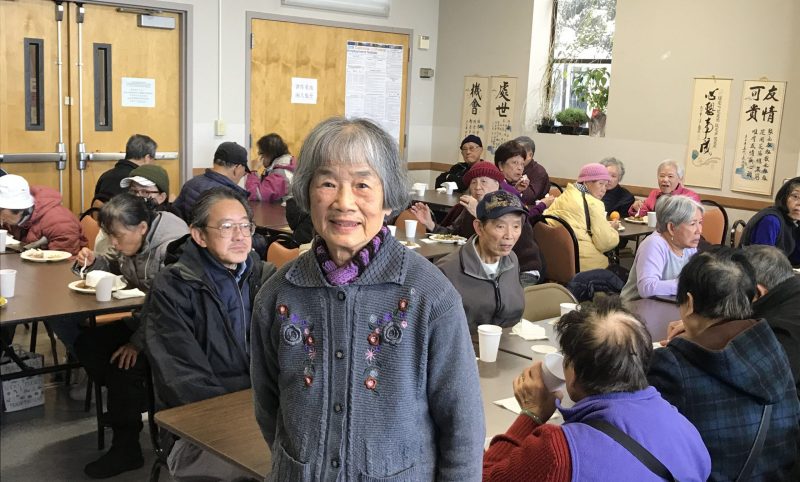Every morning at about 8:10, Xue Ya Yu leaves her Visitacion Valley home and catches Muni’s 44 O’Shaughnessy. After a transfer and an 80-minute ride that takes her across San Francisco, the 84-year-old grandmother is at the Jackie Chan Senior Center, ready to go work.
Yu, a bit frail but energetic and cheerful, has been a mainstay of the Self Help for the Elderly program for more than a dozen years. The senior center on Geary Boulevard is one of several run by the nonprofit.
When she’s not helping to organize the utensils for lunch or keeping track of fruit and other items, she might be exercising in front of a video screen, playing mahjong or handing out the scarves, pants and hats she knits and sews for her friends at the center.
“She has many friends here; she is loved,” says Lance Ma, a worker at the center who served as Yu’s Cantonese translator during a recent chat with Senior Beat.
The handmade items – Yu says she knits them at home while watching television – have a finished, professional look, the product of 14 years working in a San Francisco garment factory. Knitting and sewing “keep my fingers nimble and my brain working,” says Yu, one of the five older adults featured in San Francisco’s Reframing Aging campaign.
Yu’s journey to San Francisco was long and perilous.
Born in Taishan, a city in China’s southern Guangdong province, she lived through the Japanese occupation and years of civil war and revolution. “When the Japanese came, they surrounded our city. They smashed everything in our home. We had to sneak away.” She remembers wading chest-deep across a river as she and her family fled the violence and atrocities unleashed by the invading Japanese.
Reframing Aging: Read the whole series.
‘Older ≠ Lesser’: Just one message in new effort to squash aging stereotypes
Leadership never gets old: Retired youth counselor helped families overcome ‘disconnectedness’
Courage never gets old: A journey from drugs and destitution to role in Apple commercial
Yu graduated from secondary school after the war and taught mathematics for a time. She married her high school sweetheart, a description that makes her giggle, and the couple moved to a larger city where he worked as an oil engineer. By then, her sister had married a young man from Hong Kong and they, along with Yu’s mother, moved to California.
Having family in the United States made Yu and her husband unpopular with the Chinese government, she said. “They were suspicious of families with overseas Chinese.” Yu and her husband left China and arrived in San Francisco in 1986.
It didn’t take her long to find a job. Working in the garment factory was difficult at first. But she liked the environment and management treated the employees well, she said. Yu and her former colleagues at the factory stay in touch and meet regularly for lunch and conversation, although some are leaving San Francisco.
Yu and her husband raised a family. She has two daughters, one of whom she now lives with, a son and seven grandchildren. Her husband died in 1997, the year Yu retired.
Aging in San Francisco can be difficult, and the culture is not steeped with the same respect for elders found in China. Nonetheless, the city treats older adults with respect, Yu said, citing benefits like its extensive network of senior centers, discounts on Muni and a wide array of services for older adults.
The Jackie Chan Center, where Yu spends much of her time, has a lot to offer someone who’s not just interested in sitting in front of a television. There is table tennis, Karaoke, line dancing, exercise sessions, jewelry appraisal, and classes in classical Chinese dance, computer use, U.S. citizenship, and qing gong, a Chinese martial arts technique.
“I love to keep busy,” Yu said.

